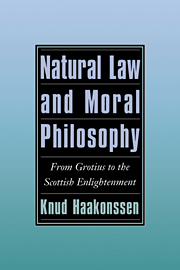Book contents
- Frontmatter
- Contents
- Acknowledgements
- Introduction: The Scottish Enlightenment in the history of ideas
- 1 Natural law in the seventeenth century
- 2 Natural law and moral realism: The civic humanist synthesis in Francis Hutcheson and George Turnbull
- 3 Between superstition and enthusiasm: David Hume's theory of justice, government, and politics
- 4 Adam Smith out of context: His theory of rights in Prussian perspective
- 5 John Millar and the science of a legislator
- 6 Thomas Reid's moral and political philosophy
- 7 Dugald Stewart and the science of a legislator
- 8 The science of a legislator in James Mackintosh's moral philosophy
- 9 James Mill and Scottish moral philosophy
- 10 From natural law to the rights of man: A European perspective on American debates
- Bibliography
- Index
7 - Dugald Stewart and the science of a legislator
Published online by Cambridge University Press: 05 June 2012
- Frontmatter
- Contents
- Acknowledgements
- Introduction: The Scottish Enlightenment in the history of ideas
- 1 Natural law in the seventeenth century
- 2 Natural law and moral realism: The civic humanist synthesis in Francis Hutcheson and George Turnbull
- 3 Between superstition and enthusiasm: David Hume's theory of justice, government, and politics
- 4 Adam Smith out of context: His theory of rights in Prussian perspective
- 5 John Millar and the science of a legislator
- 6 Thomas Reid's moral and political philosophy
- 7 Dugald Stewart and the science of a legislator
- 8 The science of a legislator in James Mackintosh's moral philosophy
- 9 James Mill and Scottish moral philosophy
- 10 From natural law to the rights of man: A European perspective on American debates
- Bibliography
- Index
Summary
Smith or Reid
The Smithian concept of a science of legislation is carried on in the work of Dugald Stewart, and yet the content of the discipline, as well as its philosophical presuppositions, undergoes changes which from hindsight we can see amount to its dissolution. Viewed in narrowly disciplinary terms, Stewart identifies the science of a legislator with political economy, but he then reconstitutes the content of political economy by making jurisprudence part of it. At the same time he virtually excludes what he calls ‘politics proper’, that is, the theory of government, from the discipline and, more or less, from scientific treatment at all. Finally, he makes it plain that he considers political economy in this sense to be a direct extension of moral philosophy and that he sees himself in this respect as continuing a tradition which had so far reached its height in the Scottish academic tradition. But despite his awareness of his intellectual ancestry, he finds no theoretical function for history in his political economy. At the level of disciplinary history, it is this explicit rejection of history and the less explicit reduction of jurisprudence to a subsidiary role within a more comprehensive discipline which are characteristic of Stewart as compared with Smith.
Behind these changes in the idea of how to study human beings in their social aspect lies a metaphysics of social phenomena and a theory of the historical process which are significantly different from those of Smith.
- Type
- Chapter
- Information
- Natural Law and Moral PhilosophyFrom Grotius to the Scottish Enlightenment, pp. 226 - 260Publisher: Cambridge University PressPrint publication year: 1996
- 1
- Cited by



